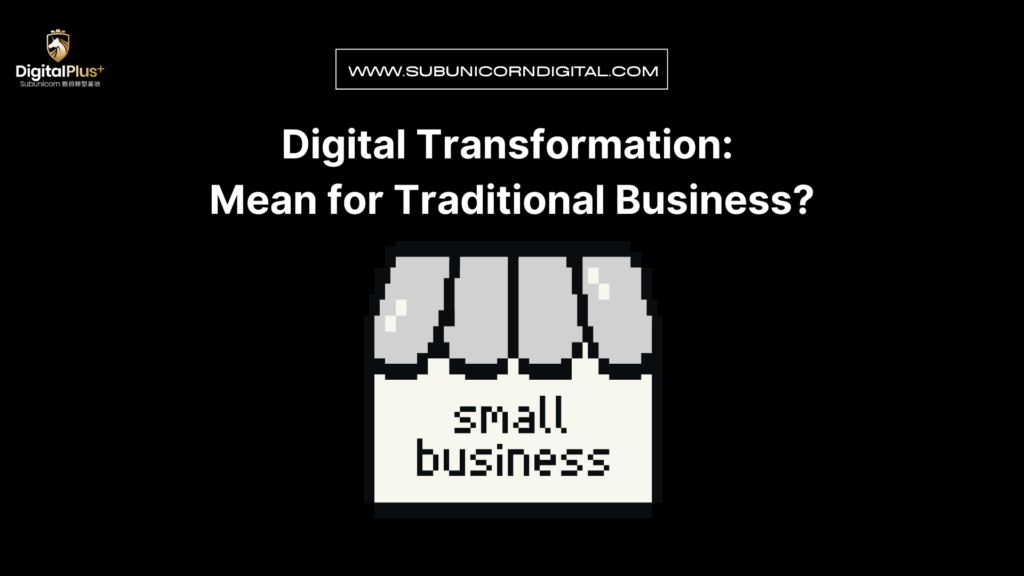As a traditional business owner, you’ve likely heard the term “digital transformation” thrown around a lot lately. It might sound like something only large tech companies or startups need to worry about, but the truth is, digital transformation is just as relevant to your business as it is to any other. But what does it actually mean for you, and how can it relate to your day-to-day operations?
Understanding Digital Transformation in Simple Terms
At its core, digital transformation is about using technology to improve the way your business operates. This doesn’t necessarily mean replacing everything you do with new, high-tech solutions. Instead, it’s about making thoughtful changes that help your business run more smoothly, serve your customers better, and stay competitive.
For example, if you’re still using paper records to manage inventory or track sales, digital transformation might involve switching to a simple software that can automate these tasks. This can save you time, reduce errors, and give you real-time insights into your business.
Is Adopting Software mean Digital Transformation?
Adopting software is a part of digital transformation, but it doesn’t encompass the entire process. Digital transformation is a broader concept that involves more than just implementing new technology.
Here’s how they relate:
1. Adopting Software as a Step in Digital Transformation
• Tool Implementation: Adopting software can be a crucial first step in digital transformation. For instance, switching from manual record-keeping to digital accounting software can automate processes, improve accuracy, and save time. However, this is just one piece of the puzzle.
• Process Improvement: The software can help streamline specific tasks, but true digital transformation requires rethinking and possibly redesigning entire business processes to take full advantage of digital tools.
2. Digital Transformation: A Holistic Approach
• Cultural Shift: Digital transformation involves a change in mindset throughout the organization. It’s about embracing a culture of innovation, where technology is seen as a way to continuously improve and evolve.
• Business Strategy: Digital transformation impacts the overall business strategy. It’s about leveraging digital tools to create new value for customers, enter new markets, or even change the business model itself.
• Customer Experience: Beyond internal improvements, digital transformation often focuses on enhancing the customer experience. This might involve adopting customer relationship management (CRM) software, but also requires aligning all customer-facing processes to deliver a seamless, personalized experience.
• Data-Driven Decisions: Digital transformation involves using data to drive decisions. This means not only having software to collect and manage data but also having the strategies and skills to analyze that data and apply it to business decisions.
3. Beyond Software: The Bigger Picture
• Integration: Adopting software in isolation might improve one aspect of your business, but digital transformation often requires integrating multiple systems (e.g., CRM, ERP, marketing automation) to ensure all parts of the business are aligned and can communicate effectively.
• Continuous Improvement: Digital transformation is an ongoing process. Simply adopting a piece of software isn’t the end—it’s about continually evaluating and improving your digital tools and processes to keep pace with changes in technology and customer expectations.
Why Should You Care About Digital Transformation?
You might wonder why this is something you need to think about. After all, your business has been successful for years, maybe even decades, without all this new technology.
However, there are a few reasons why digital transformation is important, even for traditional businesses:
1. Staying Competitive: As more businesses adopt digital tools, those that don’t risk being left behind. For example, if your competitors are using online platforms to reach new customers or improve their services, you might find it harder to keep up if you don’t do the same.
2. Improving Customer Experience: Today’s customers expect convenience. They want to be able to find information online, place orders with ease, and receive quick responses to their inquiries. By embracing digital tools, you can meet these expectations and keep your customers happy.
3. Saving Time and Money: Digital tools can automate repetitive tasks, like invoicing or managing inventory, freeing up your time to focus on other aspects of your business. In the long run, this can also save you money by reducing errors and improving efficiency.
How Digital Transformation Can Work for You?
Digital transformation doesn’t have to be overwhelming. Here are a few simple ways it can relate to your business:
- Online Presence: If you don’t already have a website or social media presence, starting one can open up new opportunities for attracting customers. Many people today look online first when searching for products or services, so being visible can make a big difference.
- Customer Engagement: Tools like email marketing or customer relationship management (CRM) systems can help you stay connected with your customers, send them offers, and keep track of their preferences.
- Streamlining Operations: Consider adopting software that can handle tasks like accounting, scheduling, or inventory management. These tools can reduce the time you spend on administrative work and help you keep better track of your business’s performance.
Taking the First Step
If you’re not sure where to start with digital transformation, that’s okay. It’s normal to feel a bit unsure about something new, especially when it comes to changing the way you run your business. The key is to start small and choose changes that make sense for you.
To help you figure out where you stand and what areas of your business could benefit most from digital transformation, we’re offering a free assessment. This assessment will help you identify the best starting points and guide you through the process, so you can take advantage of the benefits without feeling overwhelmed.
Conclusion
Digital transformation isn’t just a buzzword—it’s a way to future-proof your business, improve your operations, and better serve your customers. By embracing even small changes, you can make a big impact on your business’s success. Don’t wait until it’s too late—start exploring how digital transformation can work for you today.
If you’re ready to take the first step or just want to learn more, reach out for your free assessment and discover how digital transformation can help your business thrive.
At Subunicorn Digital Plus, we specialize in guiding businesses through their digital transformation journey. Our expertise lies in delivering customized, cloud-based solutions that streamline operations, enhance decision-making, and drive growth. We understand that each business is unique, and our tailored approach ensures that our clients receive the solutions that best meet their specific needs.
Our goal is to ensure that businesses keep pace with technological advancements and thrive in the digital age. By partnering with Subunicorn Digital Plus, you gain access to a team of experts dedicated to helping you achieve operational excellence, foster innovation, and stay competitive in an ever-changing market.





